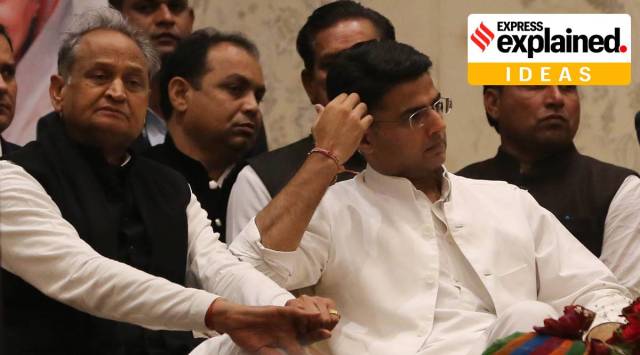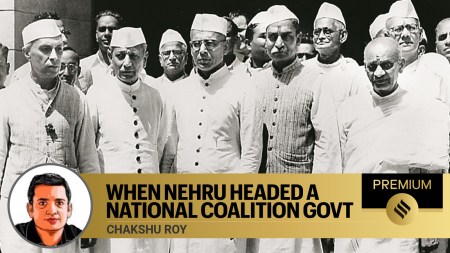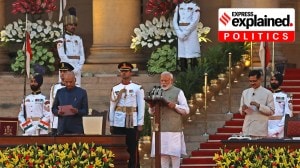- India
- International
Ideas Explained: Why the anti-defection law has failed its purpose
So far, we have taken a legalistic approach to address the problem of defection, but political issues require political solutions, writes Chakshu Roy.
 Ashok Gehlot and Sachin Pilot in Jaipur in 2018. Pilot has failed to topple his party's government in Rajasthan. (Express Photo: Renuka Puri)
Ashok Gehlot and Sachin Pilot in Jaipur in 2018. Pilot has failed to topple his party's government in Rajasthan. (Express Photo: Renuka Puri)The political crises in Manipur and Rajasthan, for the time being, have been averted. But, writes Chakshu Roy, head of legislative and civic engagement at PRS Legislative Research, “the constitutional provisions related to the anti-defection law have been reduced to a joke”.
The anti-defection law is supposed to deter MLAs from defecting from their political parties. They can lose their seats in the legislature for defying their party. And if declared a defector, they cannot become a minister in a government for six months.
 They benefit from defections and are often accused of enticing MLAs of rival parties to switch loyalties, writes Roy.(Illustration: C R Sasikumar)
They benefit from defections and are often accused of enticing MLAs of rival parties to switch loyalties, writes Roy.(Illustration: C R Sasikumar)
“MLAs and political parties have become adept at using and bypassing the anti-defection law,” says Roy.
The law to address the fickle political loyalties of elected representatives has multiple problems.
One of them is that it only punishes MLAs for switching parties. Political parties who are at the heart of our politics have no liability under the law. They benefit from defections and are often accused of enticing MLAs of rival parties to switch loyalties. Other enactments responsible for the cleansing of our politics face a similar problem.

There are limits on electoral spending by a candidate. But these limits apply only to candidates. Political parties can spend an unlimited amount on behalf of their candidates. Similarly, laws have been tightened to restrict candidates with criminal backgrounds. Individuals convicted with a prison term of over two years cannot stand for elections. But there is no restriction on political parties to give tickets to individuals who face criminal charges which are pending before courts.
According to Roy, a punishment-based legal approach underestimates the problems with our politics. A lasting solution to the problem can only come from the adherence by political parties to a code of conduct that takes into account the fundamental priorities and decencies that ought to govern the functioning of democratic institutions.
Also read | Explained Ideas: Why Bollywood alone should not be blamed for nepotism
So far, we have taken a legalistic approach to address the problem of defection. But, concludes Roy, “political issues require political solutions”.
More Explained
EXPRESS OPINION
Jun 10: Latest News
- 01
- 02
- 03
- 04
- 05






































